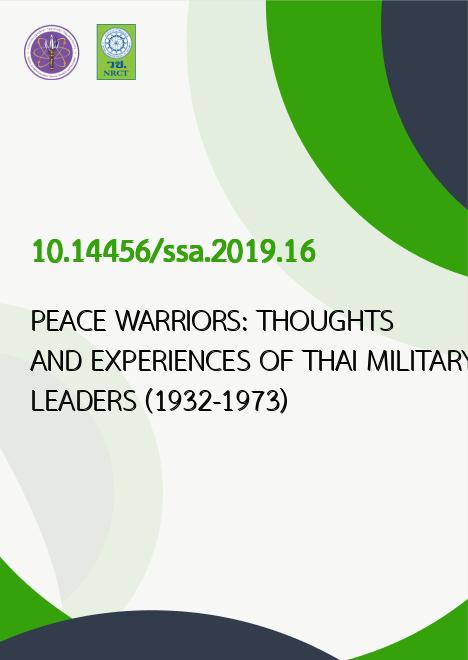
|
PEACE WARRIORS: THOUGHTS AND EXPERIENCES OF THAI MILITARY LEADERS (1932-1973) |
|---|---|
| รหัสดีโอไอ | |
| Creator | Sorasak Ngamcachonkulkid |
| Title | PEACE WARRIORS: THOUGHTS AND EXPERIENCES OF THAI MILITARY LEADERS (1932-1973) |
| Publisher | National Research Council of Thailand |
| Publication Year | 2562 |
| Journal Title | SOCIAL SCIENCE ASIA : Official Journal of National Research Council of Thailand in Conjunction with the College of Local Administration, Khon Kaen University |
| Journal Vol. | 5 |
| Journal No. | 3 |
| Page no. | 1-13 |
| Keyword | Peace Warriors, Thai Military Leaders, Thai Modern Politics |
| URL Website | http://e-journal.nrct.go.th/ |
| Website title | e-journal |
| ISSN | 2229-2608 |
| Abstract | This study focuses on the thoughts and experiences of Thai military leaders who are classed as 'Peace warriors' in modern Thai history. It argues that the seed of non-violence has gradually filtered into the Thai military culture for a long time and that there were military leaders in the past, who promoted the use of democratic rules and Parliament to effect political change. These military leaders were 'Peace warriors' or 'Pro-peace' serving officers. Although they played many important roles during the first 20 years of the Thai democratic system, their story is always overshadowed by the military's authoritarianism that led to the resolution of conflicts through the use of force. This research has been culled from the prosopography (collective biography) that traced the lives and political roles of 120 military leaders between 1932 and 1952, dividing them into two camps peace and non-peace warriors. The study cites General Phya Phahon Phonphayuhasena as the role model of the peace/pro-peace faction and Field Marshal Po. (Plaek) Phibunsongkhram as the non-peace/forceful faction. Peace military leaders in the past respected constitutional rules and used the parliamentary system to deal with political conflicts. Thus, an important principle of the peace military is its "politically led strategy", which later appears in the Prime Minister's Order 66/23 of 1980, which granted amnesty to the communist insurgents and provided the reconciliation policy for the conflict in the South. It seems that society has, so far had little space to discuss the story of the peace military, and thus historians need to elaborate more about these military leaders, who advocate peaceful solutions rather than forceful ones. |